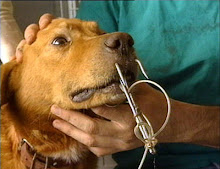The U.S. Food and Drug Administration is alerting pet owners, veterinarians, health care providers and pharmacists that pets are at risk of illness and death when exposed to the topical cancer medication Fluorouracil Cream USP 5% (5-FU.) intended for use in people. Fluorouracil may also be marketed under the brand names Carac, Effudex and Fluoroplex. People using this medication should use care when applying and storing the medication if they are also in a household with pets, as even very small amounts could be dangerous to these animals.
The FDA has received reports of five dogs that became ill and died after accidentally ingesting the topical cream. In one case, two dogs began playing with a tube of Fluorouracil and one punctured the tube before their owner could retrieve it. Within 2 hours, the dog that punctured the tube began vomiting, experienced seizures, and died 12 hours later. In a separate case, a dog located his owner’s tube of Fluorouracil and ingested its contents. The owner realized the dog had ingested the medication and rushed him to the veterinarian. The veterinarian attempted treatment, but the dog’s condition declined over three days and he was ultimately euthanized.
Although the FDA has not to date received any reports involving cats, they are also expected to be extremely sensitive to Fluorouracil cream. If an owner applies Fluorouracil cream to an afflicted area and touches their cat, the cat may accidentally ingest the medication when grooming itself and suffer adverse events.
The FDA recommends that people who use Fluorouracil take care to prevent their pets from accidentally ingesting the medication.
- Store all medications safely out of the reach of pets.
- Safely discard or clean any cloth or applicator that may retain medication and avoid leaving any residues of the medication on hands, clothing, carpeting or furniture.
- Consult your health care provider on whether it is appropriate to cover the treated area.
- If you are using topical medications containing Fluorouracil and your pet becomes exposed, consult a veterinarian immediately.
- If your pet shows signs such as vomiting, seizing or other illness, seek immediate veterinary care for your pet and be sure to provide the details of the exposure.
Veterinarians who have patients who show signs such as vomiting, seizing or other illness should ask whether anyone in the household has used topical chemotherapy containing Fluorouracil.
Health care providers who prescribe topical cancer medications containing Fluorouracil and pharmacists who fill these prescriptions should advise patients with pets to take care to prevent exposure of the pet to the medication.
Pet owners and veterinarians can also report any adverse events to the FDA, by following the link to the Form FDA 1932a.




No comments:
Post a Comment